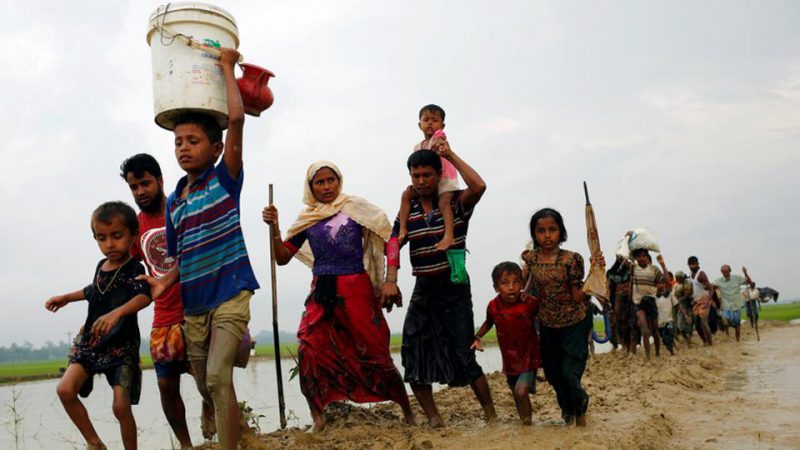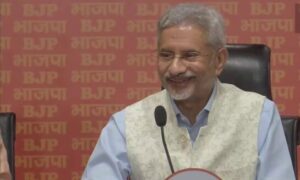
File Picture Courtesy : Hindustan Times
It is indeed a very complex issue as it requires primarily creation of an environment in Rakhine conducive to the return of the Rohingyas to their habitations in villages and towns which are in ruins ; and this demands right now a decision in principle of the government of Myanmar to consider the claims of the Rohingyas to citizenship and revoke their miserable ” stateless” situation in Myanmar.It may be noted that while it is a fact that since 1948 when Burma became free, the Government was hostile to the large presence of Chittagongian Muslims in Arakan ( now Rakhine) and hostility became more in the Rohingyas began a seperatist movement in the 1950 ‘s for autonomy and even merger with East Pakistan of the Northern Rakhine that shares borders with East Pakistan and where they were in a majority.
Even then they were accorded ‘ associate citizenship” and allowed to send two representatives to the Central legislature. This was withdrawn by the junta after the military take over in 1962 and subsequent Regulations stripped the Rohingyas of their civil rights in phases which culminated in 1982 when they were made ” stateless” whose presence as ” illegal migrants” made them liable for eviction and other penal measures. The Rohingya Muslims therefore stand as ” rejected people” in Myanmar.
The hard fact is that as of now nearly all Rohingyas would not be able to provide evidence to prove that they were pre 1824 settlers in Arakan, now Rakhine. The government of Myanmar has to declare its willingness to be flexible and to amend the provisions of 1982 Citizenship Act laying down 1824 as the cut off point for entitlement to citizenship because the first Anglo Burmese war began in 1824 when the Chittagongian Muslims provided logistics services to the British and started moving to Arakan in large numbers following the British victory in 1826 and annexation of Lower Burma which made Arakan a district of Bengal Presidency. The Rohingyas are not included in the list of 135 recognized ethnic groups considered ” indegenous” to Burma for this reason; and being stateless they are not entitled to any protection under the Myanmarese Law.
Reporting on the misery of over half a million Rohingya refugees in Bangladesh following the Myanmar Army crackdown after the Rohingya insurgents attacked Army and Police outposts on 25 th August this year, Amnesty international in its report entitled “My World is finished” accused Myanmar of committing crimes against humanity. However it’s not clear as yet that the international outcry will produce any change in the approach of Myanmar to the issue of Citizenship though there is ample room for the UN system to intervene which, to be effective would require US support critically and support of Regional powers – China, India and ASEAN countries to prevail upon Myanmar to review the core issue of Citizenship for the Rohingyas. This will be very difficult for the UN as it has not intervened in Muslim countries where citizens of other faiths have been reduced for long to second class citizens under the constitution as in Pakistan.
Moreover, there is apparently some convergence of strategic interests of China and India in peace and order in Rakhine because China’s gas and oil pipelines from Kyaukphyu on Myanmar’s west coast in Rakhine to Yunnan province of China have been commissioned in 2013 and 2015 respectively and India’s strategic Kaladan multi modal transport project to link India’s land locked North East region to Rakhine ‘ s Sittwee Port is in advanced stage of construction.
Hence their measured response to the Rohingya problem and offer of support to Myanmar to overcome the crisis. There is also the unstated view that Daw Aung San Suu Kyi must be given support to enable her to lead Myanmar’s transition to democracy. And the material support extended by Pakistan and Global Political Islam to Rohingya insurgents has complicated the matter as the Rohingya problem is not seen only as a humanitarian problem but as a part of the process of state and nation building of Myanmar. All these facts suggest that the prospects for an early end of the plight of the Rohingyas are not bright.
As the Rohingyas haven’t made a declaration giving up their separatist agenda which is the first step towards peace and reconciliation.They must do it to earn international good will and more so because the separatist object is unlikely to succeed given the geopolitical disposition of power in South Asia. For the Rohingya leadership it is time for action to initiate confidence building measures to facilitate their return to Myanmar with dignity.
( The writer is a retired IAS officer of the Assam – Meghalaya cadre and has served as Scientific Consultant in the office of the Principal Scientific Advisor to the Government of India)


















